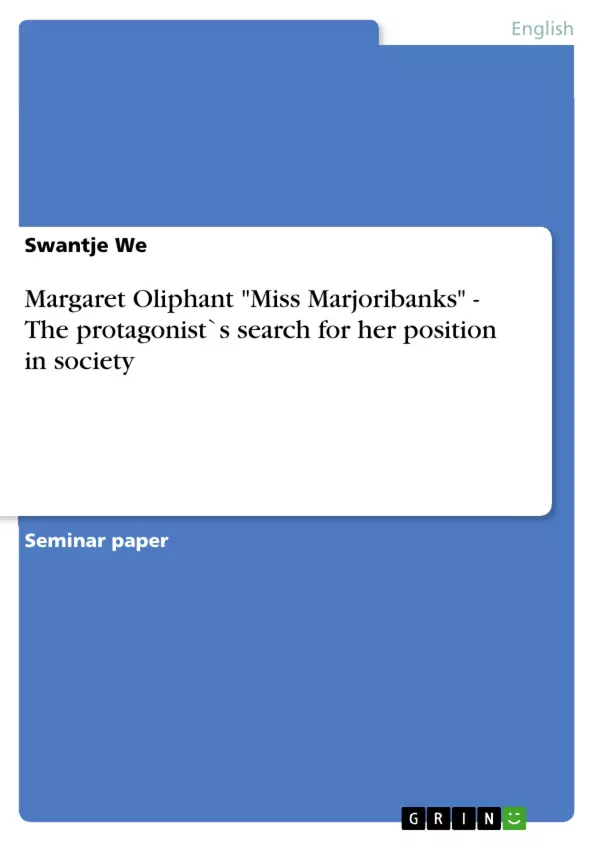“(…) in such a case as hers, it was evidently the duty of an only child to devote herself to her father’s comfort, and become the sunshine of his life” (Oliphant, 4).
Margaret Oliphant published almost a hundred novels and with ‘Miss Marjoribanks’ she created a masterpiece. The novel is about a young woman who tries to overcome the social boundaries of the Victorian era. The protagonist claims to act for her father’s comfort but in some cases it is doubtful whether Miss Marjoribanks really “devotes herself to her father” (Oliphant, 4). It rather seems that she hides herself in the image of the caring daughter in order to protract other goals.
This paper deals with the topic “Miss Marjoribanks: A Woman’s Search for her Position in Society” and will reveal some of Lucilla’s calculating actions.
Since there are two papers on the topic I will confine myself to lining out Lucilla’s aims, the steps of emancipation and I will compare Lucilla to Charlotte Brontë’s “Jane Eyre”.
2. Lucilla’s Aims
Throughout the novel, the protagonist Lucilla Marjoribanks undergoes certain developmental stages and faces various challenges that define her social status and position.
Inferior to men by Victorian world order, Lucilla tries to overcome social boundaries and challenges social order. In this case, she undertakes different campaigns in order to discard the typical role of a woman in the Nineteenth century. She wants to expand her sphere which is limited to domestic arrangements according to the Victorian image of a woman. Beyond that she contrives to change not only her own situation but to reorganise society and refute stereotypical thinking. In order to realise this campaign, she aims to take on the role of the leading actor in Carlingford.
Inhaltsverzeichnis (Table of Contents)
- Introduction
- Lucilla's Aims
- Her Mission
- Lucilla's Calculation
- A Comfort to her Father
- Popularity
- Barbara Lake
- Mrs Mortimer
- Rose Lake
- Lucilla's Calculation
- Steps of Emancipation
- Lucilla and Marriage
- Triumph or Failure
- Lucilla vs. Jane Eyre
- Conclusion
Zielsetzung und Themenschwerpunkte (Objectives and Key Themes)
This paper aims to analyze the character of Miss Marjoribanks in Margaret Oliphant's novel, focusing on her efforts to navigate the social limitations imposed on women in the Victorian era. The paper examines Lucilla's calculating actions and her quest for personal empowerment, highlighting her complex relationship with societal norms and her father's influence.
- Lucilla's pursuit of social influence and challenging Victorian gender roles.
- The impact of reputation and financial security on Lucilla's social standing.
- Lucilla's complex relationship with her father and her dependence on his reputation.
- The role of marriage in shaping Lucilla's aspirations and her desire for independence.
- A comparative analysis of Lucilla Marjoribanks and Charlotte Brontë's Jane Eyre.
Zusammenfassung der Kapitel (Chapter Summaries)
The introduction sets the stage for the analysis of Lucilla Marjoribanks, highlighting the novel's exploration of a young woman navigating the Victorian social landscape. The paper explores Lucilla's motivations and her calculated actions in her quest for a position in society. Her calculated actions, while seemingly motivated by a desire to be a comfort to her father, are often intertwined with her own ambitions for social prominence. This section investigates Lucilla's dependence on her father's reputation and her reliance on his financial security. It further explores the concept of popularity as a form of power for Lucilla and her calculated efforts to cultivate a positive image. It examines the social circles Lucilla navigates, including individuals such as Barbara and Rose Lake.
Schlüsselwörter (Keywords)
The core themes of the paper revolve around Victorian society, gender roles, social mobility, female empowerment, and the complex relationship between personal ambition and societal expectations. The analysis focuses on Lucilla's calculated actions, her dependence on reputation, her quest for popularity, and the impact of marriage on her aspirations.
Frequently Asked Questions
What is the main theme of Margaret Oliphant's "Miss Marjoribanks"?
The novel explores a young woman's search for her position in Victorian society and her attempts to overcome social boundaries through strategic and calculating actions.
How does Lucilla Marjoribanks challenge Victorian gender roles?
Lucilla seeks to expand her sphere beyond domestic arrangements, aiming to reorganize society and take on a leading role in Carlingford, which was typically reserved for men.
Is Lucilla really devoted to her father?
While she claims to act for her father's comfort, the paper suggests she often uses the image of the "caring daughter" to pursue her own goals and social prominence.
How does Lucilla compare to Charlotte Brontë's Jane Eyre?
Both characters seek emancipation, but while Jane Eyre focuses on moral and emotional independence, Lucilla focuses on social power and maneuvering within existing structures.
What role does marriage play in Lucilla's life?
Lucilla views marriage strategically, considering how it affects her aspirations and social standing rather than just seeing it as a romantic or domestic necessity.
- Quote paper
- Swantje We (Author), 2010, Margaret Oliphant "Miss Marjoribanks" - The protagonist`s search for her position in society, Munich, GRIN Verlag, https://www.grin.com/document/170861



